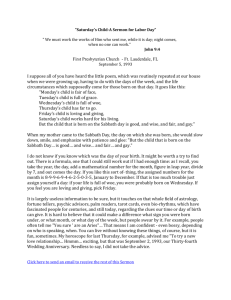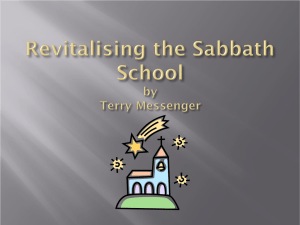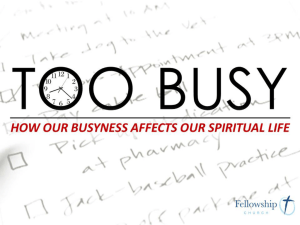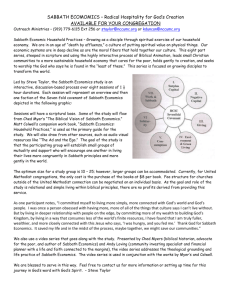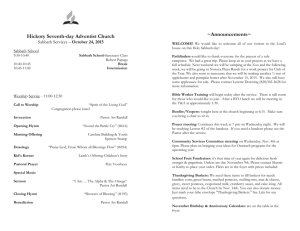book reviews - Andrews University
advertisement
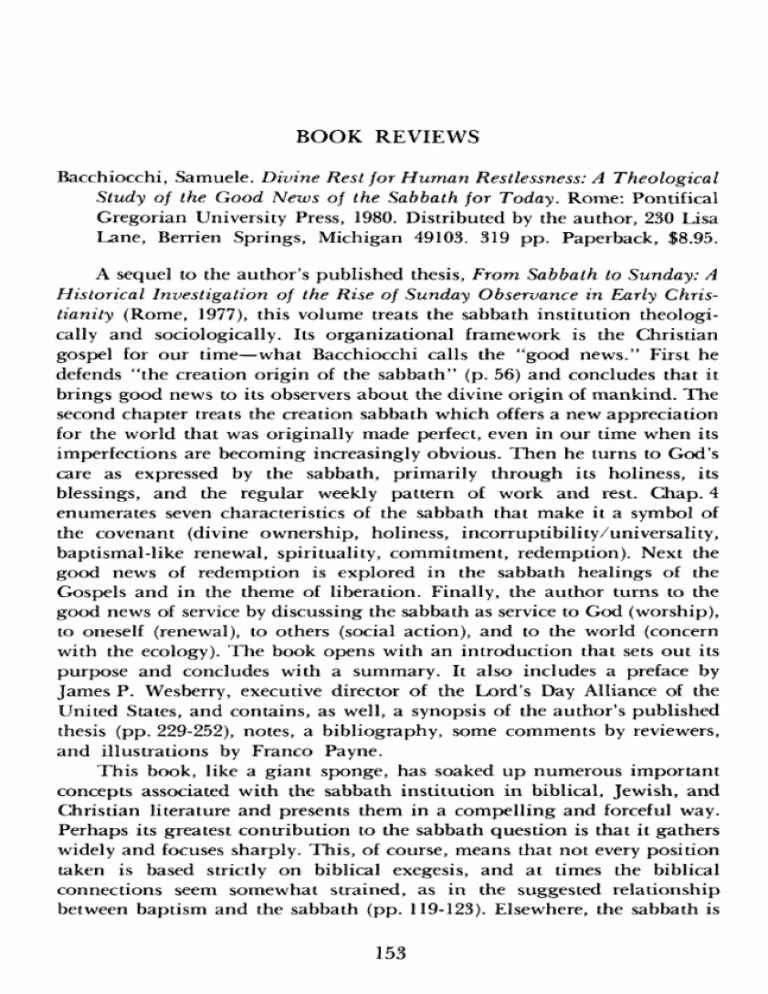
BOOK REVIEWS Bacchiocchi, Samuele. Diuine Rest for H u m a n Restlessness: A Theologica 1 Study of the Good News of the Sabbath for Today. Rome: Pontifical Gregorian University Press, 1980. Distributed by the author, 230 Lisa Lane, Berrien Springs, Michigan 49103. 319 pp. Paperback, $8.95. A sequel to the author's published thesis, From Sabbath to Sunday: A Historical Investigation of the Rise of Sunday Obseruance in Early Christianity (Rome, 1977), this volume treats the sabbath institution theologically and sociologically. Its organizational framework is the Christian gospel for our time-what Bacchiocchi calls the "good news." First he defends "the creation origin of the sabbath" (p. 56) and concludes that it brings good news to its observers about the divine origin of mankind. The second chapter treats the creation sabbath which offers a new appreciation for the world that was originally made perfect, even in our time when its imperfections are becoming increasingly obvious. Then he turns to God's care as expressed by the sabbath, primarily through its holiness, its blessings, and the regular weekly pattern of work and rest. Chap. 4 enumerates seven characteristics of the sabbath that make it a symbol of the covenant (divine ownership, holiness, incorruptibility/universality, baptismal-like renewal, spirituality, commitment, redemption). Next the good news of redemption is explored in the sabbath healings of the Gospels and in the theme of liberation. Finally, the author turns to the good news of service by discussing the sabbath as service to God (worship), to oneself (renewal), to others (social action), and to the world (concern with the ecology). The book opens with an introduction that sets out its purpose and concludes with a summary. It also includes a preface by James P. Wesberry, executive director of the Lord's Day Alliance of the United States, and contains, as well, a synopsis of the author's published thesis (pp. 229-252), notes, a bibliography, some comments by reviewers, and illustrations by Franco Payne. This book, like a giant sponge, has soaked up numerous important concepts associated with the sabbath institution in biblical, Jewish, and Christian literature and presents them in a compelling and forceful way. Perhaps its greatest contribution to the sabbath question is that it gathers widely and focuses sharply. This, of course, means that not every position taken is based strictly on biblical exegesis, and at times the biblical connections seem somewhat strained, as in the suggested relationship between baptism and the sabbath (pp. 119-123). Elsewhere, the sabbath is 154 SEMINARY STUDIES twice linked to the Immanuel sign by means of creation-with the conclusions that both contribute to the promise of an abundant life through God's presence (p. 90) and that the sabbath thereby becomes an expression of the first and second advent (p. 134). This type of reasoning is helpful by tying together various theological concepts into a unified whole, but it runs the risk of what Bacchiocchi calls "pan-sabbatism" (p. 102), that is, of allowing the sabbath to so permeate all aspects of Christian life and thought that its distinctive features become blurred. As important as its theological insights are, the practical suggestions made in the book stand out, especially in the chapters on God's care and on service. The invitation regularly to rest from one's good work, as God himself did from his, in order to step back from it, to contemplate it and to seek its meaning, is surely an important practical suggestion that can bring immense joy to life and to the worship of God. It is surely important to consider the relationship between work and rest and to draw practical consequences from it, such as the need of creativity in one's work, of consideration for the worker, and of a proper posture toward one's labor and its rewards. The book literally sparkles with ideas presented in a direct, brisk style, and it should be a mine of inspiration for its readers. It obviously treats the subject in a sufficiently general way to appeal to both sabbath and Sunday keepers and may even have a serious word for those who keep no day at all. It can be read from beginning to end; but due to frequent repetitions and summaries, its chapters can be approached in almost any order. All told, it is a welcome addition to a growing body of sabbath literature. Lorna Linda University Riverside, California 92515 Bigane, John E., 111. Faith, Christ or Peter: Matthew 16:18 in SixteenthCentury Roman Catholic Exegesis. Washington, D.C. : University Press of America, 1981. 237 pp. $18.50/9.75. In the present surge of interest in the history of sixteenth-century exegesis, an international congress in Geneva in 1976 was devoted to it. In America this interest has been nurtured in several academic centers, especially at Marquette University, Milwaukee, Wisconsin, under the leadership of Kenneth Hagen. This book is the result of research done at that university. Many a Catholic and even some Protestants will be surprised to find out that until 1560 there was no unanimity among Catholics about the real
